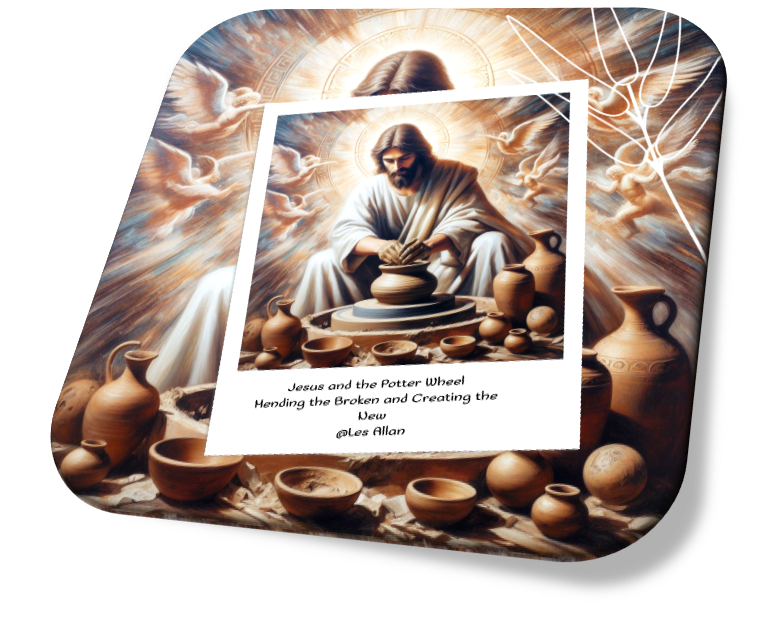
What does the Bible say about Broken Vessels?
Written by Lesallan – December 12, 2023
Many individuals have trouble coping with feelings of inadequacy, unworthiness, and weakness. They may believe God cannot utilize them for His glory due to their brokenness, flaws, or sinfulness. They may compare themselves to others who appear more successful, spiritual, or talented than themselves. They may question whether God has a plan for their lives or if He has abandoned them altogether.
The Bible presents a different perspective than what our society values. It teaches us that God often selects imperfect and ordinary individuals as His instruments. These individuals have been humbled by their limitations and sinfulness. God does not judge people based on their external appearance but rather on their hearts (1 Samuel 16:7). He does not demand perfection from us but asks us to submit to His will and allow His Spirit to dwell in us.
The apostle Paul used the metaphor of jars of clay, standard and fragile containers, to describe himself and his fellow workers in the gospel. He wrote: “But we have this treasure in jars of clay, to show that the surpassing power belongs to God and not to us.” (2 Corinthians 4:7). The treasure he was referring to was the gospel of Jesus Christ, which is the message of salvation and reconciliation with God. Paul recognized that he could not carry such a precious treasure by strength or merit. He was aware of his weaknesses, persecutions, hardships, and afflictions. However, he also knew that God’s grace was sufficient for him and that God’s power was made perfect in his weakness (2 Corinthians 12:9).
Paul was not the only one who experienced God’s power in his brokenness. Throughout the Bible, we see many examples of people God used despite their flaws and failures. Abraham lied about his wife; Moses killed an Egyptian; David committed adultery and murder; Peter denied Jesus; seven demons possessed Mary Magdalene; Zacchaeus was a tax collector; Rahab was a prostitute; and the list goes on. However, God chose them, called them, forgave them, transformed them, and used them for His glory.
God is not searching for people considered heroes or heroines in the world but rather for those who are humble and understand that they are broken and rejected individuals. These people know in their hearts that they are foolish sinners and inadequate servants before God. The state of brokenness, in this context, does not refer to an emotionally troubled or hurt heart; instead, it refers to a heart that is fully aware of our unworthiness before God. Such a heart confesses its sins, repents of its ways, and trusts in God’s mercy. It willingly yields to God’s sovereignty, submits to His authority, and depends on His provision. It loves God with all its being and loves others as itself.
“When we allow ourselves to be vulnerable before God, He can shape us into instruments of nobility that are suitable for His purposes (2 Timothy 2:21). He can infuse us with His Spirit, wisdom, love, and power. He can radiate through us as a beacon of hope in the midst of darkness and as an agent of change in the world. He can reveal His splendor through our lives as we testify to His mercy and truth.”
We are all broken in some way and need healing and restoration from God. However, we are also vessels through which God’s glory and grace can shine. Let us embrace and boast about our weaknesses rather than be ashamed of our brokenness. This way, the power of Christ can rest upon us, as mentioned in 2 Corinthians 12:9.
How can we apply these principles to our daily lives? Here are some practical steps that we can take:
Firstly, we should acknowledge our brokenness before God. We should not hide our sins or struggles from Him, as He already knows everything about us and loves us unconditionally.
Secondly, we should ask for His forgiveness and cleansing, as He is faithful and will forgive our sins and cleanse us from unrighteousness (1 John 1:9).
Thirdly, we should surrender our lives to Him and give Him control over every area of our lives, letting Him be our Lord and Master.
Fourthly, we should seek His guidance and direction by reading His Word daily and meditating on it. We should also pray without ceasing and listen to His voice.
Fifthly, we should serve Him with joy and gratitude by using our gifts and talents for His glory and sharing His love and truth with others.
Lastly, we should trust Him in every situation, knowing that He can do immeasurably more than all we ask or imagine (Ephesians 3:20) and that He works all things together for good for those who love Him (Romans 8:28).
Blessings In Christ as We Continue Life and the Journey Ahead,
Lesallan

